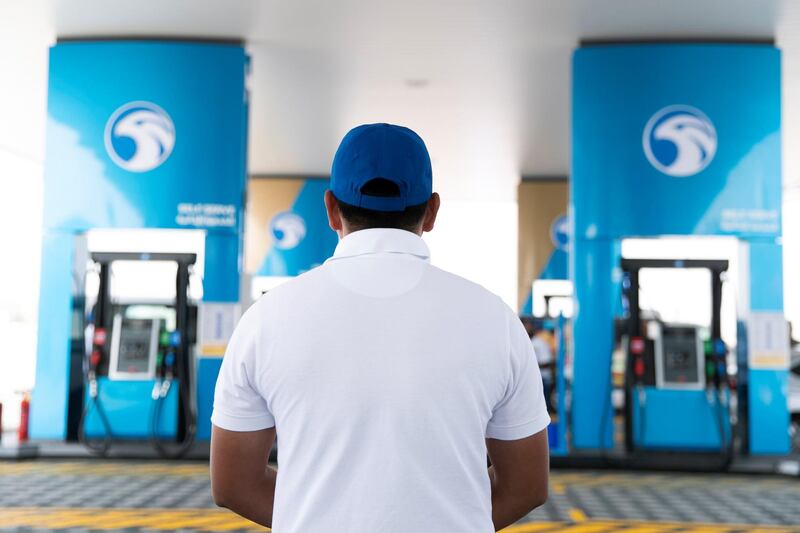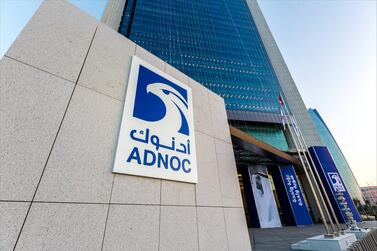Fitch's AA+ rating of Abu Dhabi National Oil Company anchors the firm as the top-rated oil and gas company globally by the rating agency, enabling it to tap debt capital markets and raise funds at cheaper rates than any other rated energy entity in the world, according to analysts.
“The biggest advantage for Adnoc is that they will be able to get the funds when needed at a much lower rate so it is certainly a competitive advantage for them,” said Chiradeep Ghosh, a banking analyst at Bahrain-based Sico Bank. “Their [Adnoc’s] credit worthiness is rock solid. It’s a confirmation of not only that, but also endorses the fact that Adnoc is a well-run entity and certainly the best among the rated oil and gas peers.”
Adnoc’s “high upstream output, significant reserves and strong profitability”, underpinned Fitch's rating of the company, which is the maximum given to companies in the energy sector according to agency's policy. Adnoc's long-term issuer default rating is AA with a stable outlook, which is the same as Abu Dhabi.
In comparison, Petrochina, Shell, BP and France’s Total are rated A+, AA-, A and AA- respectively by Fitch.
"This rating is not different from any other monitored rating from Fitch, which means that at any point in time it reflects our understanding of the company's credit risks," Dmitry Marinchenko, Fitch's oil and gas director and the primary analyst for Adnoc told The National. "With monitored ratings, we constantly check how the company performs against our expectations, and would update our assessment at least annually."
"By also providing a standalone rating we are being as transparent as possible in explaining the rationale for the rating, and I think the market appreciates that," added Mr Marinchenko.
Although, Adnoc on Tuesday said it has no plans to approach debt markets at the group level, the rating should help lower the cost of capital for any of its subsidiaries that may look to borrow from local or international debt markets.
“It makes it much easier for their subsidiaries to tap to debt markets,” Mr Ghosh said. “They may pay slightly higher cost of debt than Adnoc itself but such a high rating for the parent will give lenders a lot of comfort when dealing with subsidiaries,” he noted.
Only one Adnoc subsidiary has so far tapped the bond market. Abu Dhabi Crude Oil Pipeline (Adcop) raised $3 billion (Dh11bn) from an international bond in 2017. The deal was one of the Middle East's largest ever non-sovereign bond offerings, and was three times oversubscribed, attracting an orderbook of $11bn.
Going forward, if more of Adnoc entities decide to approach capital markets their high-rated parent company support will also reduce their relative credit risk, Mazen Al Sudairi, head of research at Al Rajhi Capital in Riyadh noted.
“It supports the subsidiaries. The rating gives creditors an image of the company how well it is managed and how credit worthy it is to repay the debt,” he said.
The state-owned company has transformed itself since Dr Sultan Al Jaber became chief executive in early 2016, morphing it into a commercially driven entity with a focus on resources and efficiency, and overall strong performance. Obtaining a credit rating from Fitch is part of this new approach, Adnoc said.
The UAE accounts for 4.2 per cent of the global production of crude, most of it from Adnoc-owned and operated fields in Abu Dhabi.
In November the oil giant said it discovered large hydrocarbon deposits equivalent to a 1 per cent increase to existing oil reserves and a 7.1 per cent addition to proven gas reserves. Currently, Adnoc has the capacity to produce 3.5 million barrels per day and plans to increase this to 4 million bpd by 2020 and 5 million bpd by 2030. It also plans in the next five years to become a net-exporter of gas.
Last year Adnoc said it plans to grow its downstream footprint at home as well as across the globe, which will need billions of dollars of investment. Some of that is expected to come from bond offerings and institutional investors, Vandana Hari, founder and chief executive of Vanda Insights noted.
"A top-notch rating from one of the world’s top-three ratings agencies is a ringing endorsement for a company, especially helpful when it is looking to tap the capital markets," Ms Hari said.
Even if Adnoc at group level doesn’t need funds, from the company's point of view, "there is pride factor that they have such a high rating”, Mr Ghosh said.







